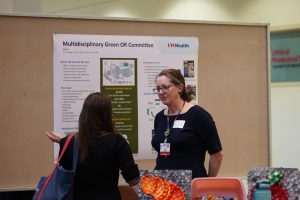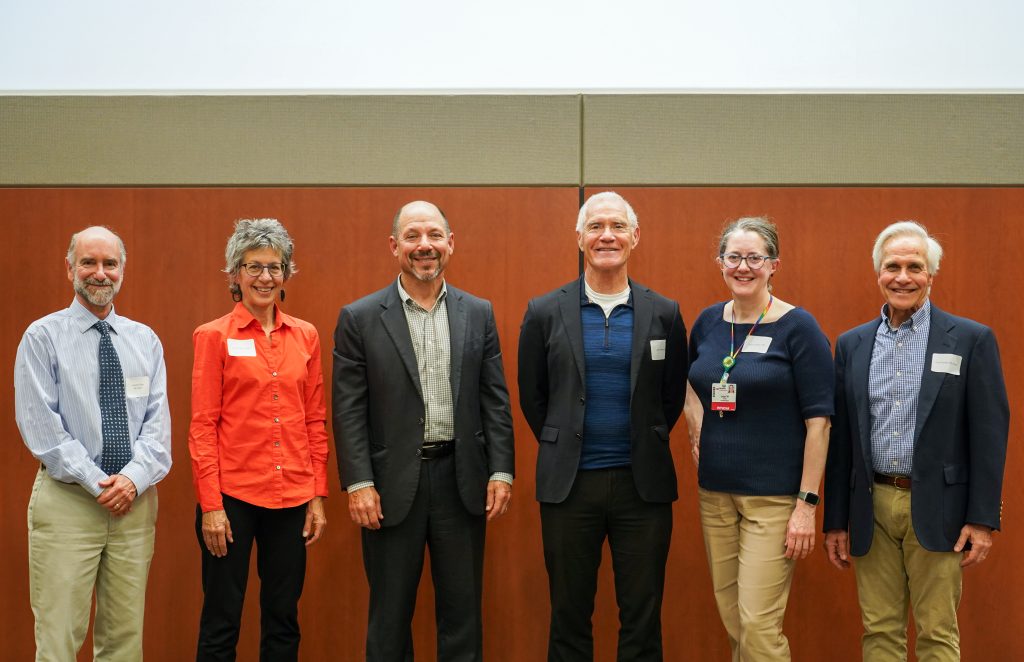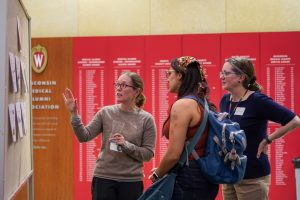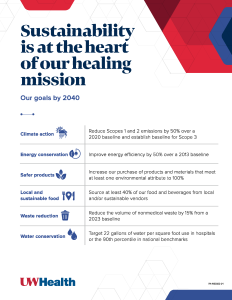Introduction
In this interview, we speak with Dr. Karin Zuegge, UW Health Medical Director of Sustainability and Professor of Anesthesiology at the University of Wisconsin School of Medicine and Public Health. Dr. Zuegge shares her insights on sustainability in anesthesia and the initiatives undertaken by her department to promote social, environmental, and economic sustainability.
Role and Accomplishments
How long have you been Medical Director of Sustainability, and what accomplishments are you most proud of?
I have been in this role since 2017. I proposed the position of Medical Director at that time because the program was being formalized into a small department within UW Health Facilities and Support Services. Prior to that, it was simply a group of concerned clinicians and staff who met over lunch to talk about what ways we were trying to make sustainable improvements in our day-to-day work.
Dr. Zuegge shared, “The collaborative and grassroots nature of this work is my favorite part. It’s exciting to see so many people working to make a difference and see how satisfying that is to them.”
I am very proud of the development of the Green OR Committee that reports to the Surgical and Procedural Operations Council. This formal structure allows for accountability and streamlines communication within our operations. Within this committee structure, front-line stakeholders can bring forward ideas, and we have the ability to collaborate to do some great quality improvement work.

Sustainability Committees and Resources
Are there sustainability committees or task forces you can recommend on campus?
Yes! The UW Madison Office of Sustainability has great resources, and multiple ways to become informed or get involved can be found at: https://sustainability.wisc.edu/.
It’s also exciting to know that UW Madison has robust sustainability goals. Chancellor Jennifer L. Mnookin formally announced this ambitious environmental sustainability initiative in February of 2024: https://news.wisc.edu/uw-madison-launches-ambitious-environmental-sustainability-initiative/.
Education and Waste Reduction
How has the department of anesthesiology achieved enhanced social, environmental, and economic sustainability through education and waste reduction?
Education has been at the heart of this entire process. It started with a grand rounds lecture on the economic and environmental problem of physical waste in the operating rooms. Then a resident gave a grand rounds presentation about the enormous carbon footprint of volatile anesthetic agents. The compound with the highest carbon footprint (desflurane) also turned out to be the most expensive of the agents we purchased. This provided a perfect opportunity for a high-impact waste reduction project.

Faculty, anesthetist, and resident education presentations were given, a signage and labelling campaign was developed, a website section devoted to sustainability was created, and choice architecture was implemented to encourage and educate users about the impact of this gas. Toward the end of this process, a provider survey revealed a consensus that this agent was no longer needed, and the decision to no longer purchase this agent was brought before the hospital pharmaceutical and therapeutics committee.
Further targets for improvement were identified, and the Green OR Committee became a formal entity. We continue to educate, measure, and report on our progress in an ongoing cycle of quality improvement.
This waste reduction process has a direct and significant impact on the finances of all of UW Health, considering the cost of providing anesthesia and surgery. The energy, waste, and emissions reductions we achieve improve the environment and health for patients and our community. This is of particular importance to socially and economically disadvantaged communities, whose residents are more likely to live near landfills and power plants.

UW Health Sustainability Celebration
How has the recent “UW Health Sustainability Celebration,” cohosted by the University of Wisconsin Department of Pediatrics, Healthy Climate Wisconsin, and the UW Health Sustainability Program, enhanced awareness of the programs?
This event started as a visiting professor grand rounds lecture in the Department of Pediatrics, where Dr. Jeff Thompson, former CEO of Gundersen Health in La Crosse, was invited to speak on the topic of healthcare sustainability. The pediatrician faculty host, Dr. Paul Sondel, contacted our small sustainability team at UW Health to ask how this event could reach a larger audience and possibly generate further interest in this topic.

We suggested that, in addition to the traditional lecture format, a celebration of the great work being done across UW Health be showcased with a poster session and some ceremony. Healthy Climate Wisconsin was also engaged, and this group lobbied for the event to be “zero waste,” i.e., have no disposable dishes or cutlery. The date was fixed due to Dr. Thompson’s invitation, but it also offered an opportunity to highlight sustainability on a date far from the usual April events. We hoped this would help demonstrate the year-round nature of this work instead of only bringing it to mind near Earth Day.
Despite the coinciding opening of Eastpark Medical Center being very near this date, we had a very good turnout, and it was a great success. We hope that every department can see how these events can be done sustainably. Perhaps other departments will consider hosting similar events when they have a speaker on this topic. There has been some discussion of collaborating again to organize a follow-up event in the future.
Sustainability in Construction Projects
How does implementing sustainability in construction projects benefit the UW Health and UW campus? Are there synergies with other sustainability goals in the city of Madison or throughout the State of Wisconsin?
The buildings in our organization use the largest amount of energy that we can directly control. Around 70% of the emissions associated with our buildings are attributed to our hospitals. That means that any new construction or renovation project the organization undertakes can be planned with sustainability in mind from the very beginning for a better outcome.
UW Health has had several achievements in this area:
- First healthcare clinic in Wisconsin to earn LEED* Silver certification: Stoughton Clinic in 2010
- First hospital in Wisconsin to earn LEED Gold certification: East Madison Hospital (formerly The American Center) in 2017
- Seven total LEED-certified buildings.
- Pursuing LEED Gold at Eastpark Medical Center.
- The largest rooftop solar canopy in the state was turned “on” at Eastpark Medical Center in April 2024.
*LEED stands for Leadership in Energy and Environmental Design. This is a 3rd party certification from the US Green Building Council.
We have many community and statewide partners: the City of Madison, Dane County, our utility companies (MG&E and Alliant Energy), Healthy Climate Wisconsin, Wisconsin Sustainable Business Council, just to name some of them. Sustainability work done by any one of these groups benefits the others. This is particularly evident in our reliance on our energy providers. As soon as our utilities reach net zero, we as customers will also get there. Together, we can help move the needle toward improvement.
Current Goals and Future Plans
What are the current goals of UW Health for sustainability in anesthesia, and are we on track to meet those goals?

In July of 2024, the sustainability team presented updated 2040 goals to UW Health’s executive leadership team, and these were approved by Dr. Kaplan. They were made public in September 2024 (figure 1).
This presents an opportunity for us as a department and as part of surgical and procedural services to evaluate our next steps. Most of this work is done collaboratively in the Green OR Committee. Current projects this group is focusing on are:
- Nitrous oxide waste mitigation by switching from pipeline to e-cylinder supply. This project began at AFCH in January of 2024, and we are expanding to University Hospital starting in late 2024.
- Fresh gas flow (FGF) reduction education to further reduce our volatile anesthetic agent usage. We are developing new vaporizer labels and staff education modules around FGF best practices.
- Normothermia project in collaboration with surgical operations. The goal is to reduce waste of single-use forced air warming devices while improving normothermia measures as part of surgical site infection prevention. There is a small group collaborating on staff education and a formal QI project around temperature management in the OR.
Conclusion
In conclusion, Dr. Karin Zuegge’s dedication to sustainability in anesthesia has significantly impacted UW Health and the broader community. Her efforts in education, waste reduction, and collaborative initiatives continue to drive progress towards a more sustainable future. As UW Health pursues its ambitious 2040 goals, the department of anesthesiology remains at the forefront of promoting health through social responsibility.